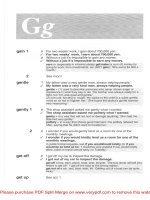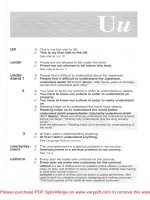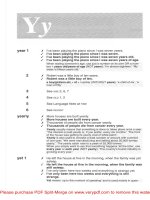Longman Dictionarry of Common Errors_ Part 2.3
Bạn đang xem bản rút gọn của tài liệu. Xem và tải ngay bản đầy đủ của tài liệu tại đây (6.95 MB, 24 trang )
gain 1
2
gentle
gently 1
get off
get up
X For two weeks' work, I gain about 700,000 yen.
,/ For two weeks' work, I earn about 700,000 yen.
X Without a job it's impossible to gain any money.
,/ Without a job it's impossible to earn any money.
earn or (especially in informal styles) get/make (a sum of) money by
going to work, from investments, etc (NOT gain): 'She earns $4,000 a
month.'
See PROFIT
?
My father was a very gentle man, always helping people.
,/ My father was a very kind man, always helping people.
gentle
=
(1) used to describe someone who never shows anger or
impatience in what they say or do: 'His brother was always ready for a
fight, but Tim was quiet and gentle.'
(2) not loud, forceful or rough: 'He spoke to the child in a quiet, gentle
voice so as not to frighten her.' 'She found the doctor's gentle manner
very reassuring.'
X The shop assistant asked me gently what I wanted.
,/ The shop assistant asked me politely what I wanted.
gently
=
in a way that will not hurt or damage anything: 'She held the
little bird very gently.'
politely
=
in a way that shows good manners: 'He politely refused her
offer, saying that he didn't want to trouble her.'
2
X I wonder if you would gently lend us a room for one of the
monthly meetings.
,/ I wonder if you would kindly lend us a room for one of the
monthly meetings.
In polite formal requests, use if you would/could kindly (or if you
would be so kind as to): 'I would be very grateful if you would kindly
allow Julian to leave school early on Tuesday.'
X I got off my car to inspect the damage.
,/ I got out of my car to inspect the damage.
get off a bus, train, plane, boat, ship, bicycle: 'The bus driver will tell you
where to get off.' 'I got off the train at the wrong station.'
get out of a car, taxi, boat, train, lift: 'Getting out of a boat can be quite
tricky.'
See BED 1
Please purchase PDF Split-Merge on www.verypdf.com to remove this watermark.
go 147
give
glad 1
glass
glasses 1
go 1
2
X She gave to him some cheese sandwiches .
.I
She gave him some cheese sandwiches.
X They always give to the new students a warm welcome .
.I
They always give the new students a warm welcome.
give sth to sb BUT give sb sth (WITHOUT to)
Compare: 'They gave a medal to each member of the team.' 'They gave
each member of the team a medal.'
X I would be glad if you could send me an application form .
.I
I would be grateful if you could send me an application
form.
To make a formal request, use would be grateful if (NOT glad): 'We
would be grateful if you could consider this matter at your earliest
convenience.'
X She was a very glad person, and very intelligent.
.I
She was a very happy person, and very intelligent.
X We hope that you will like this school and be glad here .
.I
We hope that you
will like
this school and be happy here.
glad (not used in front of a noun)
=
pleased and happy about something
in particular: 'I'm so glad your wife is feeling better.' 'I'm glad it wasn't my
turn to pay.'
happy
=
enjoying life: 'She's a lot happier now that the examinations are
over.'
X I have to vacuum the floors and clean the glasses of the
windows .
.I
I have to vacuum the floors and clean the windows.
X The sunlight poured in through the glasses of the bedroom
window .
.I
The sunlight poured in through (the panes of) the bedroom
window.
pane (or window-pane)
=
a sheet of glass used in a window: 'The two
cracked panes will have to be replaced.'
Note that pane and window-pane are rarely used. Their meaning is
usually expressed by window.
X He wears an old-fashioned glasses which make him look
intelligent.
.I
He wears old-fashioned glasses which make him look
intelligent.
Glasses
(=
spectacles) is a plural noun: 'I wear glasses just for reading.'
'Have you seen my glasses?'
2
See PAIR 2
X The next morning she went to see us at the hotel.
.I
The next morning she came to see us at the hotel.
Come is used for movement towards the speaker/listener: 'Come in and
sit down for a few minutes.' 'When can' come and see you?'
Go is used for movement in other directions: 'Could you go upstairs and
turn the lights off?'
Please purchase PDF Split-Merge on www.verypdf.com to remove this watermark.
148 go ahead
2
x
How do I go to the Holiday Inn?
./ How do I get to the Holiday Inn?
X He was lost and didn't know how to go back home .
./ He was lost and didn't know how to get back home.
When you mean 'arrive', use get (to): 'I got to the classroom five minutes
late.' 'When does the train get there?'
3
X We go to swim every day on holiday .
./ We go swimming every day on holiday.
X They've gone for camping on Lantau Island .
./ They've gone camping on Lantau Island.
go swimming/sightseeing/shopping etc: 'They've probably gone
fishing.'
4 X That evening my boyfriend and I went out to walk .
./ That evening my boyfriend and I went for a walk.
go for a walk/swim/jog etc: 'Would anyone like to go for a drive?'
5
See TO 2
6 See CAR
go ahead
7
See FIRE 1, 3
go down
go out
goal
golden
X Without additional qualifications, it will be impossible for me to go
ahead in my career .
./ Without additional qualifications, it will be impossible for
me to get ahead in my career.
If you are successful in your career, studies etc, you get ahead (NOT go
ahead): 'The old education system favoured boys, and girls found it
difficult to get ahead.'
X Culture shock begins as soon as you go down from the plane .
./ Culture shock begins as soon as you get off the plane.
See note at GET OFF
X As soon as the bus stopped, he went out.
./ As soon as the bus stopped, he got off.
X I went out of the car and waited for someone to stop and help me.
./ I got out of the car and waited for someone to stop and help me.
See note at GET OFF
X We reached our goal just after three o'clock .
./ We reached our destination just after three o'clock.
goal
=
something that you hope to achieve: 'The company's goal is to
double its share of the personal computer market.'
destination
=
the place that you are travelling to: 'The immigration
officer wanted to know my destination and how long I was planning to
stay.'
X It's a navy blue coat with golden buttons .
./ It's a navy blue coat with gold buttons.
X The purse contained six golden coins .
./ The purse contained six gold coins.
Please purchase PDF Split-Merge on www.verypdf.com to remove this watermark.
goods
149
Golden is used in idiomatic expressions such as 'a golden opportunity',
'a golden handshake', 'a golden wedding anniversary', and in the phrase
'golden hair' (used mainly in literary styles).
To describe something that is made of gold or is the colour of gold, use
gold: 'a gold bracelet', 'a black dress with red and gold stripes down the
front'.
gone
X 'Have you ever gone to France?' she asked.
./ 'Have you ever been to France?' she asked.
In British English, been is used when someone has visited a place and
returned. Gone is used when the person is still in the place they are
visiting. Compare: 'Peter has gone to Paris.'
(=
he has not yet returned)
'Peter has been to Paris.' (= he has visited Paris and returned)
In American English gone can be used instead of been.
gonna
X
Do you know when the plane is gonna land?
./
Do you know when the plane is going to land?
X
The principal is gonna give a talk in the morning.
./
The principal is going to give a talk in the morning .
Do not use gonna (= going to) or wanna (= want to) unless you are
trying to represent informal conversation.
good 1
X
I don't speak English very good.
./
I don't speak English very well.
Good is an adjective: 'She is a very good singer.'
Well is an adverb: 'She sings very well.'
2
X
I hope I'll do good in tomorrow's test.
./
I hope I'll do well in tomorrow's test .
If you are successful (in a test, interview etc), you do well (in it): 'I did
quite well in maths and chemistry but my physics result was very
disappointing.'
3
X
My sister is very good in squash,
./
My sister is very good at squash.
X
I'm not very good in writing essays.
./
I'm not very good at writing essays .
be good at (doing) sth: 'He's good at all science subjects.' 'Are you any
good at chess?'
4
X
There's no good putting a very young child in a kindergarten.
./
It's no good putting a very young child in a kindergarten .
X
It's no good to want to help the poor if you don't do anything
about it.
./
It's no good wanting to help the poor if you don't do
anything about it.
it is no good/use (doing sth)
=
it is pointless: 'It's no good having a car
if
you can't drive.'
5
See Language Note at DO
goods
X
He had very little money and very few goods.
./
He had very little money and very few possessions .
Please purchase PDF Split-Merge on www.verypdf.com to remove this watermark.
150 gossip
gossip
got
grade
graduate
granted
grave 1
goods
=
things that are made to be sold: 'The supermarket has a wide
variety of frozen goods.' 'The average family's weekly expenditure on
goods and services has risen by 20%.'
possessions
=
all the things that a person owns: 'After his mother died,
Andrew had the unpleasant task of sorting through her possessions.'
X She told me gossips about all her relations .
.I
She told me a lot of gossip about all her relations.
See Language Note at SCENERY
X I got several friends who don't want children .
.I I have (got) several friends who don't want children.
Got is not used to replace have: 'I have two sisters.' 'I've got two sisters.'
(NOT 'I got two sisters.')
X By the end of the war he had been promoted to the grade of
captain .
.I
By the end of the war he had been promoted to the rank of
captain.
Soldiers, sailors, police officers etc have different ranks (NOT grades):
'She joined the police force in 1990 and quickly rose to the rank of
sergeant.'
X I graduated at Seoul National University with a degree in politics.
,/ I graduated from Seoul National University with a degree in
politics. .
You graduate from a university: 'She graduated from Hull University in
1994 with a first class honours degree in chemistry.'
X We cannot take for granted that a computer system will never
fail.
.I
We cannot take it for granted that a computer system will
never fail.
take it for granted (that ...) WITH it
=
assume that something is true or
will happen: 'She didn't ask me if I wanted to go. She just took it for
granted.'
See also APPRECIATE 2
X I don't have any grave problems .
.I I don't have any serious problems.
X Blackmail is a grave crime .
.I
Blackmail is a serious crime.
grave
=
extremely serious and worrying, especially because someone's
life or happiness is in danger: 'The situation has become increasingly
grave and war now seems inevitable.' 'The shortage of food and medical
supplies is giving rise to grave concern.'
2
X We went to see the 'Valley of the Kings', where the grave of
Tut-mah-Amun was found .
.I
We went to see the 'Valley of the Kings', where the tomb of
Tut-mah-Amun was found.
grave
=
a place in the ground where a dead person is put: 'The coffin
was slowly lowered into the grave.'
tomb (pronounced /turrn/)
=
a place where a dead person is put. A tomb
Please purchase PDF Split-Merge on www.verypdf.com to remove this watermark.
ground 151
greatly
group
ground 1
is usually made of stone and is above the ground: 'Our first stop was the
Tomb of the Unknown Soldier.'
X Living standards have improved greatly .
./ Living standards have greatly improved .
./ Living standards have improved enormously.
X The children greatly cheered me up.
./ The children cheered me up a lot.
Greatly is usually placed in front of a main verb, especially in
passive structures: 'Your kind offer is greatly appreciated.' 'Stories of
panic on Wall Street have been greatly exaggerated.'
To emphasize the meaning of an active verb, use enormously,
tremendously or (in informal styles) a lot at the end of the clause: 'In
the last forty years education in China has changed enormously.'
X The people of each group have to guess the word.
./ The people in each group have to guess the word.
the + noun + in a group: 'The girls in my group all come from Italy.'
Note however member + of a group: 'The members of my group took it
in turns to take notes.'
X Turkey occupies about 40 per cent of our ground .
./ Turkey occupies about 40 per cent of our land/territory.
See Language Note on next page
2
X They do not have enough food or ground to grow it on .
./ They do not have enough food or land to grow it on.
See Language Note on next page
3
X Gradually the ground loses the ability to hold water .
./ Gradually the soil loses the ability to hold water.
X My job is to analyse samples of ground .
./ My job is to analyse samples of soil.
See Language Note on next page
4
X People who suffer from backache often sleep on the ground .
./ People who suffer from backache often sleep on the floor.
See Language Note on next page
5
X The school building is very old and the ground is very small.
./ The school building is very old and the grounds are very
small.
See Language Note on next page
6
X A shot rang out and one of the men fell on the ground .
./ A shot rang out and one of the men fell to the ground.
X I fell on the ground, hoping that nobody had seen me.
./ I fell to the ground, hoping that nobody had seen me.
Use on the ground when you are thinking about position: 'Someone had
dropped one of their gloves on the ground.' 'We sat down on the ground
just outside the cage.'
When you are thinking about downward movement or (violent)
movement from a standing position, use to the ground: 'The parachute
failed to open and he plummeted to the ground.' 'The impact knocked
Please purchase PDF Split-Merge on www.verypdf.com to remove this watermark.
152 grow
him spinning to the ground.' 'They pushed him to the ground and
grabbed his wallet.'
FLOOR-GROUNO-GROUNOS-LANO-
TERRITORY -SOIL
floor
The
floor
is the surface that you walk on when you are
indoors: 'Our cat likes to sit on the floor under my desk.' 'It's
about time someone cleaned the kitchen floor.'
ground
The
ground
is the surface that you walk on when you are
outdoors: 'The ground was covered with snow.' 'In the
middle of the forest was a bare patch of marshy ground.'
grounds
Grounds
refers to the area surrounding and belonging to a
school, hospital, hotel, stately home, etc, usually enclosed by
a wall or fence: 'Parking within the hospital grounds is strictly
prohibited.'
land
Land
refers to (1) an area of ground that is owned or used by
someone, or that is controlled by a particular country: 'All the
land from here to the stream belongs to the Pattersons.'
'Disagreements about land have led to many wars.'
(2) (also
the land)
the part of the Earth's surface that is not
covered by water: 'After three days at sea, I was looking
forward to being on land again.'
territory Territory
is the area that is controlled by a particular country,
army or power: 'One of the results of losing the war was that
the country had to give up almost half its territory.' 'They had
wandered by mistake into enemy territory.'
soil
Soil
is the material in which plants and trees grow: 'This plant
needs rich soil to grow well.'
I
grow 1
)<
Many of these children grow in an atmosphere of violence.
,/ Many of these children grow up in an atmosphere of
violence.
grow
=
(1) (of children, animals, plants etc) develop or get bigger as part
of a natural process: 'Mary's little boy grew four centimetres last year.'
'Orchids don't grow in cold climates.' (2) cause plants, vegetables etc to
do this by taking care of them: 'In the back garden we grow onions,
potatoes and carrots.'
grow up
=
(of children) pass from childhood into maturity: 'Of course I
know him - we grew up together in New York.' 'Tom wants to be a
scientist when he grows up.'
2
)<
Some parents need to be taught how to grow their children.
,/ Some parents need to be taught how to bring up their
children.
bring up (or raise)
=
look after children until they are old enough to
leave home, teaching them how to behave and what to think about the
world: 'He was brought up to believe that men and women are equal.'
Please purchase PDF Split-Merge on www.verypdf.com to remove this watermark.
guitar 153
grow up 1
X
The country's GNP is growing up very quickly .
./ The country's GNP is growing very quickly.
grow
=
increase (in number, volume, cost etc): 'The population is
expected to grow by 20% over the next ten years.'
2 X Calcium helps your bones to grow up.
./ Calcium helps your bones to grow.
X With a garden you can grow up your own vegetables .
./ With a garden you can grow your own vegetables.
See note at GROW 1
grown-up
X
These films are too violent not only for children but also for
grown-up people .
./ These films are too violent not only for children but also for
grown-ups.
Instead of using grown-up person/people, use grown-up as a noun:
'Grown-ups are so boring! All they want to do is talk!' Note that grown-
up is used mainly by children. The more common word is adult.
guarantee
X
May I remind you that the cassette recorder is still in guarantee .
./ May I remind you that the cassette recorder is still under
guarantee.
under guarantee (NOT in): 'The watch was still under guarantee so they
repaired it free of charge.'
guidance
X
I greatly appreciate all your help and guidances .
./ I greatly appreciate all your help and guidance.
Guidance is an uncountable noun: 'The council provides guidance and
support for students wishing to study abroad.'
guilty 1
X
The jury charged the defendant guilty .
./ The jury found the defendant guilty.
X He was tried and judged guilty of murder .
./ He was tried and found gUilty of murder.
find sb guilty/innocent: 'Despite the flimsy evidence, the jury found her
guilty.' 'The accused was found guilty and sentenced to five years'
imprisonment. '
2
X They feel guilty of neglecting their duty .
./ They feel gUilty about neglecting their duty.
X A lot of women feel guilty to leave their children alone or with
another person .
./ A lot of women feel guilty about leaving their children alone
or with another person.
(be) guilty of a crime or doing something wrong: 'The jury found thJ
defendant guilty of murder.' 'He was guilty of driving without a licence or
insurance.'
(feel) guilty about (doing) sth
=
ashamed: 'I still feel guilty about not
visiting her while she was in hospital.'
guitar 1 See PLAY 3
2
See CLASSIC 2
Please purchase PDF Split-Merge on www.verypdf.com to remove this watermark.
154 gymnastic
gun
gymnastic
See SHOOT 2
X I took up gymnastic when I was at school.
,/ I took up gymnastics when I was at school.
Gymnastic (WITHOUT -s) is an adjective: 'Her gymnastic ability was
recognized at a very early age.'
The noun is gymnastics (WITH -si: 'Her career in international
gymnastics began at the age of twelve.'
Please purchase PDF Split-Merge on www.verypdf.com to remove this watermark.









